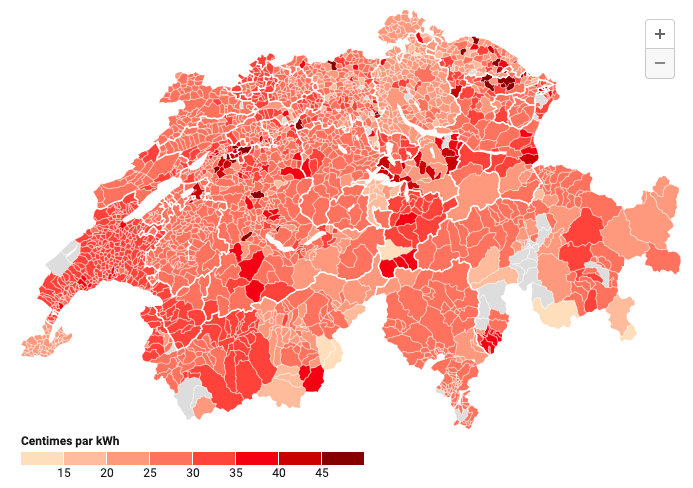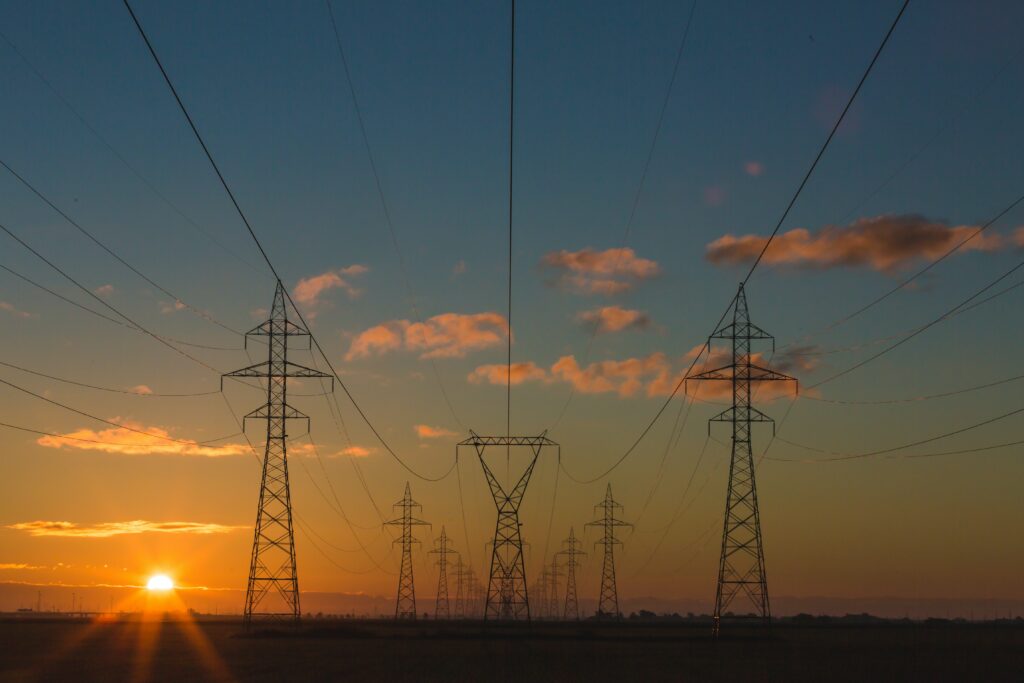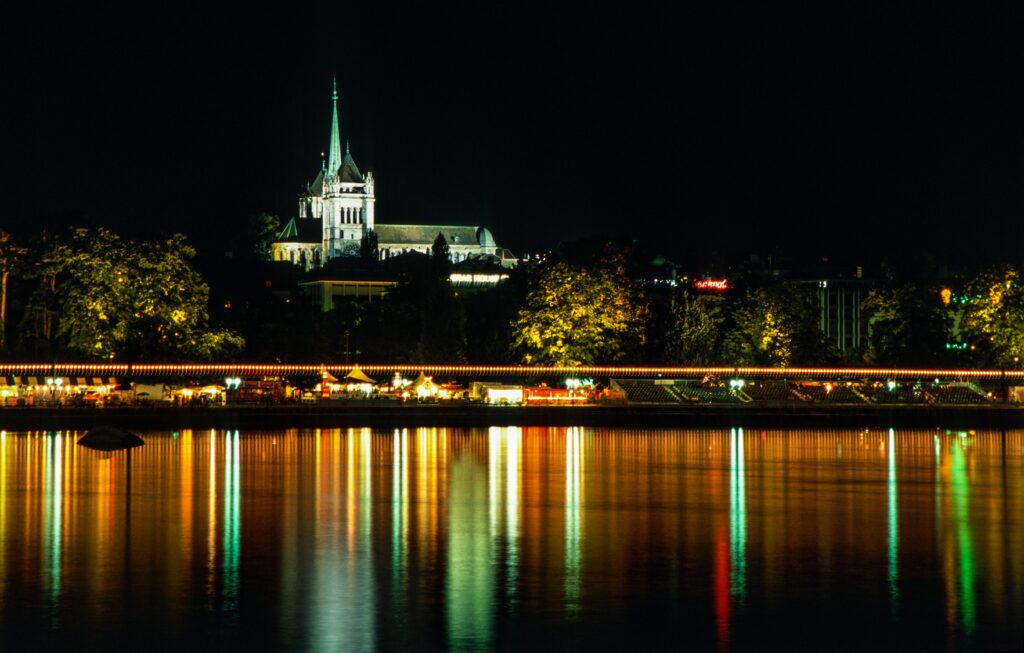Mi., Okt. 5th 2022
Despite urging the Swiss for weeks to reduce their energy consumption in preparation for a looming shortage this winter, the Swiss have failed to do so according to a new report. If the trend continues, the government may have to resort to penalizing residents with fines and possibly jail time; and, start using rolling, regional blackouts to save energy.

View the interactive version of this map to see how each region will be affected by rising energy prices in 2023. Some areas will see as much as a 280 percent hike.
No change in electricity consumption
Switzerland is self-sufficient during the warmer months thanks to hydro and nuclear power; but, must import about 40 percent of its energy from neighboring Germany and France from October to April. Since Russia invaded Ukraine earlier this year, much of Europe has been focused on one question – ‘can we rely on Russia as an energy source?’ – and the recent rupture of the Nord Stream pipeline has been no comfort to them.
Although not all energy consumers have reported their data yet, the early trends show that electricity consumption in September remained at about the same levels as September 2021.
In August, the Swiss government launched its conservation campaign “Energy is scarce, let’s not waste it,” with about half of the Swiss population reporting that they were willing to make sacrifices. According to the data for September, the Swiss have failed to move the needle at all. (Read more: Switzerland’s energy crisis pulling nation apart)
People are wary of restrictions and mandatory measures following two years of Covid-19 lockdowns, says Werner Luginbühl, president of the electricity watchdog Elcom. Moreover, some manufacturers are actually increasing production in preparation for winter, so it may be too soon to tell.

As temperatures drop and energy prices rise, Switzerland is scrambling to prepare for shortages.
The question of natural gas
Swiss natural gas consumption has dropped by 20 percent over the last two months, as prices have steadily increased, according to the Federal Office for National Economic Supply (FONES).
“Switzerland is currently on track, but the alert cannot yet be lifted for the winter,” FONES’s head of energy Bastian Schwark told local newspaper NZZ. He added that natural gas reserves in Germany are almost 90 percent full – which is good as Switzerland buys about 70 percent of its natural gas from their northern neighbor – but, Germany will not get through the winter months on that alone. Heating homes and businesses account for about 75 percent of Switzerland’s energy consumption during the winter, though not all heating comes from natural gas.
“If the winter is cold, things could get tight,” Schwark said. Many homeowners and residential buildings which rely on natural gas for heating filled up their reserves only halfway considering the high prices. Government officials are concerned that those tanks will be empty at about the same time across the country – in the coldest depths of February.
For now, the Swiss government is beseeching residents to keep their thermostats at 19 degrees C or below and turn off heating to pools and jacuzzis.

The electricity the Kernkraftwerk plant in Leibstadt generates makes a substantial contribution towards Switzerland’s energy supply. Stop Blackouts is pushing Switzerland to rely more heavily on nuclear power.
The 19 C degree limit: Is it legal?
The Swiss Real Estate Association, which represents landlords, says asking residents to keep their thermostats below 19 degrees is in direct violation of a 2017 Swiss Supreme Court ruling that says tenants are entitled to 20-21 degrees. For reference, about 60 percent of the Swiss population live in rented apartments and houses – the highest percentage in Europe.
A government spokesperson on Monday made an announcement that the Supreme Court ruling allows for deviations in certain situations. But even if the measure is enforced, it is unclear who would be held legally accountable if that degree is exceeded – the landlord, the tenant or the government who implemented the restrictive measure?
“The current discussions prove that this measure simply cannot be implemented,” Linda Rosenkrantz, the general secretary of the Swiss Tenant’s Associationsagte dem SonntagsZeitung. The group has written a plea to the government saying that a 19-degree limit is unreasonable for the elderly and other vulnerable persons.

Local governments are weighing whether turning off public lighting at night is a more pressing matter than public safety concerns.
In some parts of Switzerland, such as in Fribourg, the local governments are pushing for strict conservation measures, such as limiting elevator use to only handicapped persons and turning off public street lighting from midnight to 5:30 a.m. In Zürich, local officials have yielded to protestors by agreeing to keep public lighting on all night to prevent crime. One government official went so far as to suggest group showers as a way to conserve hot water. For now, the federal government is asking all residents to pitch in, by:
-Turn laptops, mobile phones and other appliances off completely. Leaving fully charged appliances and technology on standby consumes needless energy.
-Turn off lights. Leaving lights on in unoccupied rooms is a waste of energy.
-Keep lids on pots. A lot of energy evaporates into the air when lids are left off pots and pans while cooking. Keep lids on and food will cook faster.
-Showers over baths. Take short showers at no hotter than 37 degrees.
Dieser Artikel darf frei weitergegeben und nachgedruckt werden, vorausgesetzt, es wird auf den Originalartikel verwiesen.
